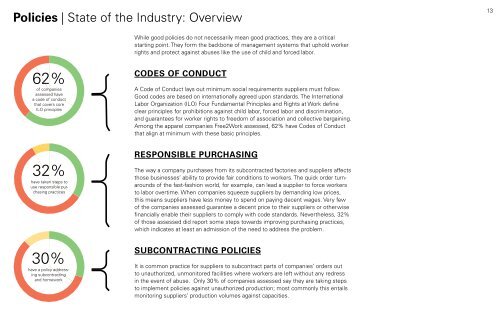APPAREL INDUSTRY TRENDS - Free2Work
APPAREL INDUSTRY TRENDS - Free2Work
APPAREL INDUSTRY TRENDS - Free2Work
Create successful ePaper yourself
Turn your PDF publications into a flip-book with our unique Google optimized e-Paper software.
Policies | State of the Industry: Overview<br />
62%<br />
of companies<br />
assessed have<br />
a code of conduct<br />
that covers core<br />
ILO principles<br />
32%<br />
have taken steps to<br />
use responsible purchasing<br />
practices<br />
30%<br />
have a policy addressing<br />
subcontracting<br />
and homework<br />
While good policies do not necessarily mean good practices, they are a critical<br />
starting point. They form the backbone of management systems that uphold worker<br />
rights and protect against abuses like the use of child and forced labor.<br />
CODES OF CONDUCT<br />
A Code of Conduct lays out minimum social requirements suppliers must follow.<br />
Good codes are based on internationally agreed upon standards. The International<br />
Labor Organization (ILO) Four Fundamental Principles and Rights at Work define<br />
clear principles for prohibitions against child labor, forced labor and discrimination,<br />
and guarantees for worker rights to freedom of association and collective bargaining.<br />
Among the apparel companies <strong>Free2Work</strong> assessed, 62% have Codes of Conduct<br />
that align at minimum with these basic principles.<br />
RESPONSIBLE PURCHASING<br />
The way a company purchases from its subcontracted factories and suppliers affects<br />
those businesses’ ability to provide fair conditions to workers. The quick order turnarounds<br />
of the fast-fashion world, for example, can lead a supplier to force workers<br />
to labor overtime. When companies squeeze suppliers by demanding low prices,<br />
this means suppliers have less money to spend on paying decent wages. Very few<br />
of the companies assessed guarantee a decent price to their suppliers or otherwise<br />
financially enable their suppliers to comply with code standards. Nevertheless, 32%<br />
of those assessed did report some steps towards improving purchasing practices,<br />
which indicates at least an admission of the need to address the problem.<br />
SUBCONTRACTING POLICIES<br />
It is common practice for suppliers to subcontract parts of companies’ orders out<br />
to unauthorized, unmonitored facilities where workers are left without any redress<br />
in the event of abuse. Only 30% of companies assessed say they are taking steps<br />
to implement policies against unauthorized production; most commonly this entails<br />
monitoring suppliers’ production volumes against capacities.<br />
13


